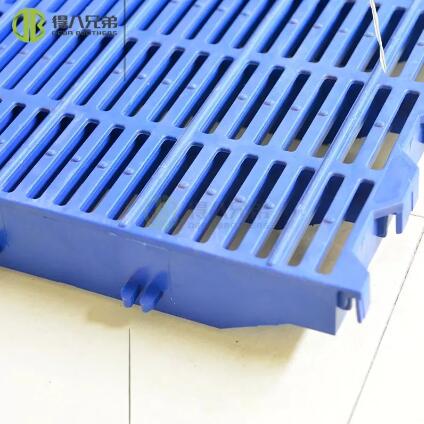Simplifying Farm Upkeep: Maintenance Differences Between Swine Plastic Floors and Traditional Flooring Systems
2024-06-20
Effective flooring is vital in swine farming, affecting the health, welfare, and productivity of pigs. Swine Plastic Floors have emerged as a modern solution, offering unique advantages over traditional flooring systems like concrete and metal slats. This blog explores how maintaining Swine Plastic Floors differs from other flooring types, highlighting the specific benefits and ease of upkeep they provide.
Understanding Swine Plastic Floors
Swine Plastic Floors are designed with pig welfare and farm efficiency in mind. They offer a flexible, hygienic, and durable alternative to traditional materials, with a maintenance regimen that simplifies farm operations.
1. Ease of Cleaning
Non-Porous Surface:
- Swine Plastic Floors have a smooth, non-porous surface that resists absorbing moisture, urine, and manure.
- Traditional floors like concrete can be porous, absorbing liquids and leading to bacterial buildup.
Simple Cleaning Process:
- Plastic floors are easily cleaned with high-pressure washers and mild detergents.
- Concrete floors often require more intensive scrubbing and stronger chemicals to eliminate stubborn stains and odors.
2. Hygiene and Sanitation
Reduced Bacterial Growth:
- The non-porous nature of plastic floors significantly reduces the risk of bacterial growth and disease transmission.
- Metal slats and concrete can harbor bacteria in crevices and pores, increasing the need for frequent and thorough disinfection.
Fewer Chemicals Required:
- Due to their easier cleaning, plastic floors typically require fewer chemicals for effective sanitation, reducing costs and environmental impact.
3. Durability and Longevity
Resistant to Wear and Corrosion:
- Swine Plastic Floors are resistant to wear, corrosion, and cracking, even under heavy use.
- Metal slats can rust and degrade over time, while concrete may crack or erode, necessitating frequent repairs and replacements.
Lower Maintenance Costs:
- The durability of plastic floors translates to lower maintenance costs over time, as they require less frequent repairs and replacements compared to traditional floors.
4. Waste Management
Efficient Waste Removal:
- Plastic floors are designed with gaps or slots that allow urine and manure to pass through easily, promoting efficient waste removal.
- Traditional flooring systems might not facilitate waste removal as effectively, leading to buildup and requiring more frequent manual cleaning.
Cleaner Environment:
- The effective waste management of plastic floors helps maintain a cleaner and more hygienic environment for pigs, reducing health risks and improving overall farm conditions.
5. Temperature Regulation
Thermal Properties:
- Plastic floors offer better thermal insulation, maintaining a more consistent and comfortable temperature for pigs.
- Concrete floors can become very cold, especially in winter, increasing the need for additional bedding and heating solutions.
6. Maintenance of Structural Integrity
Stable and Secure:
- Swine Plastic Floors maintain their structural integrity over time, with less risk of warping or becoming uneven.
- Concrete can shift and crack, and metal slats can bend, leading to potential hazards and requiring more frequent inspections and adjustments.
Consistent Performance:
- The resilience of plastic floors ensures consistent performance and safety, reducing the need for regular structural assessments.
Conclusion
The maintenance of Swine Plastic Floors presents several advantages over traditional flooring systems used in swine farming. Their ease of cleaning, superior hygiene, durability, and efficient waste management make them a practical and cost-effective choice for modern pig farming operations. By simplifying maintenance routines and reducing the need for frequent repairs, Swine Plastic Floors contribute to a healthier and more productive farming environment. Embracing these innovative flooring solutions not only enhances pig welfare but also supports sustainable and efficient farm management, ultimately benefiting both farmers and their livestock.



